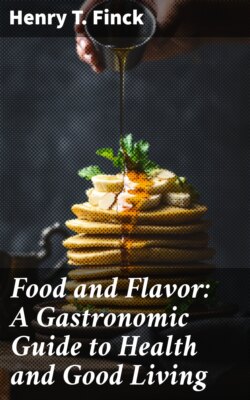Читать книгу Food and Flavor: A Gastronomic Guide to Health and Good Living - Henry T. Finck - Страница 21
На сайте Литреса книга снята с продажи.
THE HARM DONE BY SOFT FOODS.
ОглавлениеTable of Contents
Dr. Campbell, whose admirable articles on The Importance of Mastication cannot be too urgently brought to the reader's attention,[2] has pointed out a very important reason why at present, more than at any other time in the history of man, there is need of mouth digestion.
The art of cooking has had a beautifying effect on the human face. The jaws and teeth have become smaller because they are no longer called upon to bite off and chew raw, tough, and fibrous foods, as they were in primitive days. One of the results of agricultural progress has been to diminish the fibrous, cellulosic food and make it more easy to masticate. The food of to-day is for the most part soft and pappy, of a kind which does not compel thorough mastication; so much so that Dr. Campbell thinks we may speak of this as "the age of pap."
Beginning with the babes, we pour into their stomachs all kinds of artificial saccharine foods in liquid or semi-liquid form, following this up, later on, with such viands as mashed potatoes and gravy, rusks soaked in milk, milk puddings, bread dipped in bacon fat, pounded mutton, thin bread and butter, and the like. Food of this kind does not invite mastication (nor have mothers been taught to teach their children to keep it in the mouth, the doctor might have added). "Hence the instinct to masticate has little opportunity of exercise and not being properly exercised, tends to die out. Small wonder that the child nourished on such pappy food acquires the habit of bolting it, and learns to reject hard, coarse foods in favor of the softer kinds; everything, nowadays, must be tender, pultaceous, or 'short.'"
The evils resulting from the bolting of this soft food by children and adults alike are of the gravest and most alarming kind. Overeating and habitual indigestion are two of them. Morbid craving for food not needed is another. It is not improbable that the habitual bolting of food, by the prolonged irritation to which it gives rise, may predispose to cancer of the stomach. Napoleon was a notoriously fast eater and it is well known that he died from this disease.
Dr. Campbell also agrees with Sir Frederick Treves that the neglect of the mastication of food is a potent cause of appendicitis. Solid lumps, especially in the case of such articles as pineapple, preserved ginger, nuts, tough meat and lobster, are apt to pass beyond the pylorus and, escaping intestinal digestion, to lodge in the cœcum and precipitate an attack of that dreaded disease, the most common predisposing cause of which is a loaded cœcum, often preceded by constipation.
Summing up his extremely valuable paper on the Evils of Insufficient Mastication, Dr. Campbell comes to the conclusion that "an appalling amount of misery and suffering may be saved by the simple expedient of inculcating the habit of efficient mastication."
It is difficult to teach an old dog new tricks. I have noticed again and again how hard it is to teach adults to "Fletcherize." They begin it, find it irksome at first, and drop it. For thorough reform we must begin with infants; but adults cannot be urged too strongly to persevere till the habit—like that of breathing—becomes automatic. The rewards in increased health and enjoyment of life and work are glorious.
